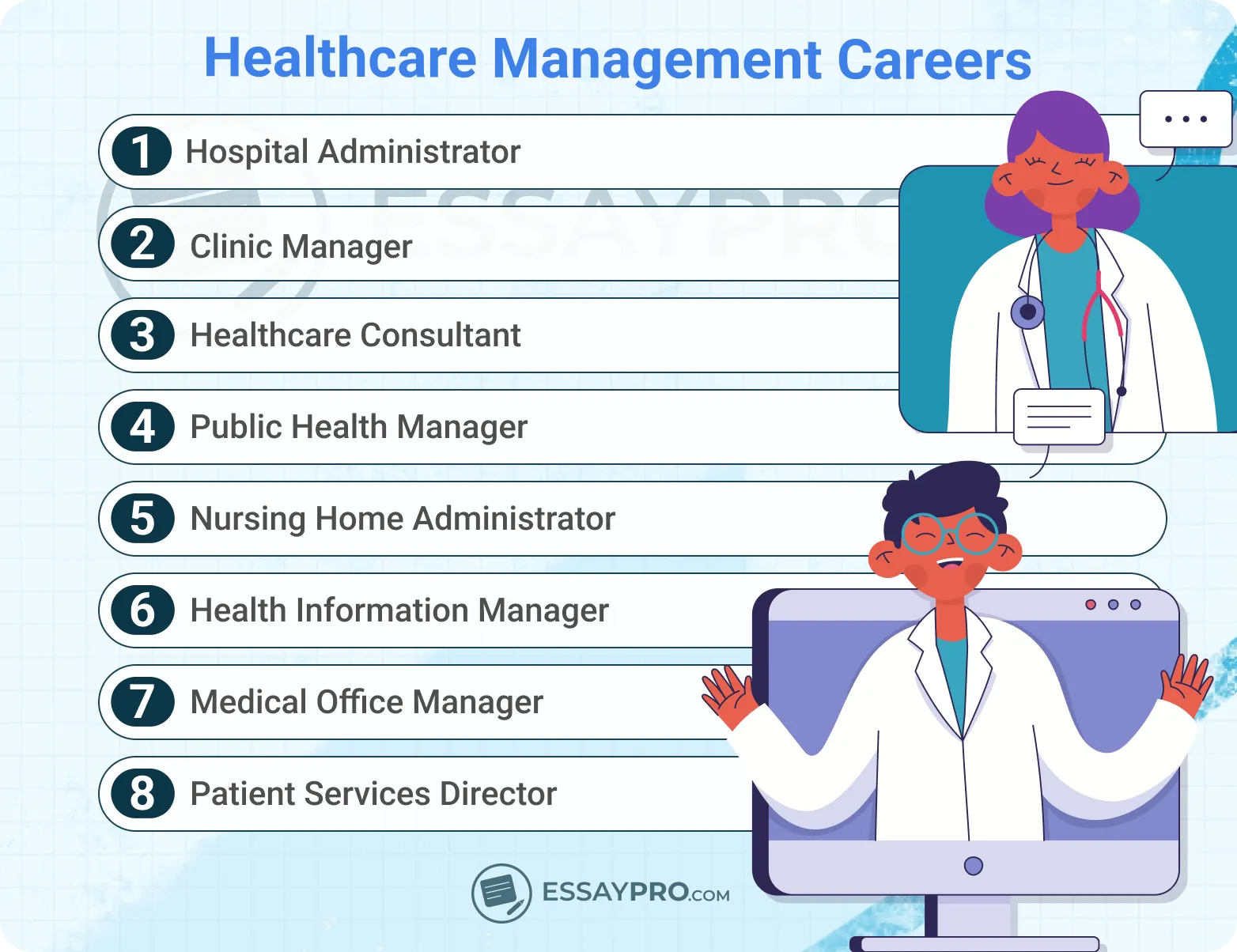Most people only see the doctors and nurses. But someone’s the reason the lights are on and the right tools are in the right place when they’re needed. That's the job of healthcare managers: less visible, but no less critical. Every year, about 14,700 students finish a bachelor’s degree in this field. Another 2,800 complete associate programs. These numbers show how the demand has grown for this degree.
This article explains management in healthcare and the kind of future you can build with the right degree. If you're facing too many deadlines and find yourself dreaming, 'I wish I could just pay someone to write my paper,' EssayPro can connect you to a human writer who can get you just the right academic support when you need it.
What Is Healthcare Management?
Healthcare management is a field that mixes long-term planning with immediate action. You can see how complex these systems could be, so if you're a student who needs to work through the
details of healthcare management for school, a trusted medical school essay writing service can be more than helpful.
Healthcare management professionals oversee how a medical environment functions on a daily basis. That could involve everything from setting schedules to reviewing compliance records or simply addressing errors that could worsen the patient experience. People in this role are rarely visible to patients, but their work requires strong coordination and influences almost all aspects of patient care.


Where a Degree in Healthcare Management Can Take You
Many people think of hospitals when they hear healthcare management, but the career paths stretch so much farther beyond that. This degree opens doors to all kinds of roles where you can help care systems work better for patients. Here are a few places where you'll be able to put your degree to use:
- Hospitals and health systems: Managers here help with budgets and step in when something about the daily flow isn’t working.
- Outpatient care centers: A healthcare manager makes sure schedules are clear and services stay on track.
- Private physician practices: Healthcare managers in smaller offices keep things organized. They make sure the administrative side of the office doesn’t interfere with patient care.
- Insurance companies: The work here involves reviewing claims and checking that all the policies follow the rules.
- Long-term care facilities: These settings need healthcare professionals who can support routines and make sure every resident is looked after properly.
- Public health organizations: Managers often work on programs that reach the wider community. They track progress and help keep everything funded.
- Healthcare consulting firms: This role involves helping other healthcare groups improve. A consultant might step in when a system isn’t working or when a clinic needs a fresh plan.
- Medical technology companies: Tech companies need healthcare managers who understand how care works. These roles help new tools fit into real medical settings.
- Government health agencies: This work focuses on public programs. Managers help run services and keep track of how well they’re doing.
Healthcare Management Job Requirements
The field of healthcare management expects you to have proper education, practical experience, and, depending on the role, certification. Most employers look for:
- A degree in healthcare management or a related field
- Hands-on experience in a clinical or administrative setting
- Certifications that match your role or specialty
Education
Most entry-level roles in healthcare management start with a bachelor's degree. Some choose programs built specifically for this field, while others come in through public health or business. If you aim for a leadership position at a larger facility, you'll likely need to advance to a master's program as well. Especially when strategic planning and decision-making become part of the job, degrees like MHA or MBA come into play.
Experience
You can have all the right degrees, but that's not the only thing you'll need to get your foot in the door. Hiring managers prioritize those who have spent time in the right settings. That could be a clinic, an insurance office, even a long-term care facility. Entry-level experience counts, too, as long as it shows you understand the importance of the work.
Internships and part-time roles help build that background early. They also show that you’re ready to solve problems under pressure and adapt to the constant changes in the field. For many students, experience is where confidence really starts to grow.
Certification
This part entirely depends on your focus. Healthcare managers in a long-term care facility might need a state license; other positions might ask you for credentials like the Certified Medical Manager (CMM) or the Fellow of the American College of Healthcare Executives (FACHE). In any case, proper certifications definitely help you stand out among applicants.
Healthcare Management Careers
Careers in healthcare management are anything but limited. Depending on your interests, there are a lot of different paths that could land you a managing role at a small clinic or a consulting job at hospitals across the country. Each job has a different pace and purpose, but all have one thing in common: they keep healthcare systems functional. Here are some of the most common career paths:

- Hospital Administrator
- Clinic Manager
- Health Information Manager
- Public Health Manager
- Healthcare Consultant
- Nursing Home Administrator
- Medical Office Manager
- Patient Services Director
Hospital Administrator
Healthcare administrators make sure hospitals run without falling into chaos. Their job consists of coordinating departments and handling the decisions that affect patient care. When systems fail, administrators are often the ones expected to put things back in order to guarantee a proper patient experience, even if they never step into an exam room.
Clinic Manager
Things move a lot faster in a smaller setting, so the stakes are higher as well. Clinician managers oversee operations every day and help teams solve problems as they appear. This hands-on role expects the healthcare manager to step in the second something disrupts the right flow of care.
Health Information Manager
This job focuses more on patient records than people. Health information managers deal with the systems that store sensitive data and make sure nothing slips through the cracks. That could mean anything from monitoring access to electronic health records to checking if the privacy laws are being followed correctly.
Public Health Manager
When your focus is on the community, the job shifts in a different direction. Public health managers often work with government departments to roll out programs that respond to local needs. They follow data trends, coordinate outreach, and try to improve care before patients even step into a facility.
Healthcare Consultant
If you're wondering what is a healthcare consultant, the easiest way to describe it is a person who looks closely at a healthcare organization and figures out what's getting in the way of everything working smoothly. Consultants spot the problems and help teams come up with the solutions.
Nursing Home Administrator
Nursing home administrators are required to have something that can't be taught from a textbook: empathy. You have to care deeply about the people who depend on you. Administrative responsibilities of this job include overseeing care routines and making sure everything is up to standards, but the main thing is to guarantee every resident feels safe and supported.
What You Should Know About Healthcare Management Salary and Job Growth
Healthcare management offers the kind of career path that builds on itself. The pay is solid and the demand is only getting stronger. The median salary for healthcare managers is about $117,960. But this number changes based on your experience and the responsibilities you take on.
The real benefit is job growth. Roles in this field are expected to grow by 29% by 2033, a lot faster than the average for all other occupations. The skill of managing change without disrupting care isn't exactly easy to find, which is why the opportunities are expanding. In fact, tens of thousands of new positions are expected each year.
How to Become a Healthcare Manager?
Most people aiming to become healthcare managers follow a similar pattern. Here are the details of the path that aspiring managers usually walk through.
- Start with Education
- Get Experience
- Grow Into the Role
- Look into Certifications
- Keep Learning
Start with the Right Education
Most people begin with a degree that helps them understand how care systems operate. Some take the first step with an associate program. Others go for a bachelor’s right away. The exact major might vary, but what matters is that you’re learning how healthcare works from the inside out. If a leadership role is in your plans, you'll have to earn a master's degree as well.
Get Hands-On Experience
There’s only so much you can pick up from books and lectures. You'll have to spend some time in real healthcare settings so you can see how the pieces come together (and where they fall apart). Internships can give you a feel for the pressure and the pace that you'll have to work with.
Grow Into the Role
This job is about people just as much as it is about logistics. Any good healthcare manager must be able to solve problems without panicking and make some tough calls to make sure the team remains steady under pressure. These are the skills you pick up by being present when it actually matters.
Think About Certification
Some jobs require it. Others don’t. But if you plan to move up, it’s worth considering. A certification tells employers you’re serious and willing to go further than the basics. For certain roles (like nursing home administrator), you’ll need to meet licensing rules anyway, so it’s good to look into that early on.
Keep Learning
Healthcare never stops changing and neither should you. What works now might need rethinking in a year. The ones thriving in healthcare management are the ones who stay curious all the time. So, keep asking questions and learning, and be sure to adapt when the system throws something new your way.
What It All Comes Down To
Keep these in mind as you move forward as a healthcare manager:
- This field requires you to know how to make care systems run better for everyone involved.
- Most roles start with a degree, but you can't get far without experience in real settings
- Salaries are high, and the demand for skilled healthcare managers continues to grow each year.
- Career paths are different. Each role in a hospital or a consulting firm brings different challenges and rewards.
If you've decided to prioritize real-life experience and need extra help with the coursework, you can always ask for assistance. EssayPro can connect you with professional writers and give you nursing paper help at every step of the writing process.
Dealing With Nursing Papers?
Your time is better spent learning the principles of patient care, not losing sleep over formatting guidelines.
FAQ
What Is the Meaning of Healthcare Management?
Healthcare management makes sure patient care happens the way it should. That means handling all the moving parts that help the system run smoothly. The goal of this field is to keep everything organized so patients can get help without any delays.
What Is the Highest Paying Job in Healthcare Management?
If we’re talking about top earnings, CEOs and COOs at major hospitals or healthcare companies are usually at the top. But these roles come with as much pressure and responsibility as salaries.
What Degree Is Needed for Healthcare Management?
Most people start with a bachelor’s degree in healthcare management, public health, or business. If you’re aiming for a higher-up position, you’ll likely need a master’s degree.

Annie Lambert
specializes in creating authoritative content on marketing, business, and finance, with a versatile ability to handle any essay type and dissertations. With a Master’s degree in Business Administration and a passion for social issues, her writing not only educates but also inspires action. On EssayPro blog, Annie delivers detailed guides and thought-provoking discussions on pressing economic and social topics. When not writing, she’s a guest speaker at various business seminars.
U.S. Bureau of Labor Statistics. (2024, August 29). Medical and Health Services Managers. Bls.gov. https://www.bls.gov/ooh/management/medical-and-health-services-managers.htm




 (1).webp)
.webp)

